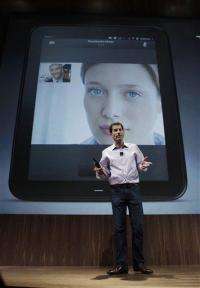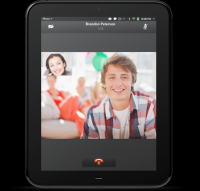HP shows first webOS tablet computer, the TouchPad (Update 2)

Hewlett-Packard Co. unveiled its first tablet computer that uses smart phone pioneer Palm's technology on Wednesday - a skinny black gadget that the companies believe will help them catch up with Apple Inc.'s immensely popular iPad.
Jon Rubinstein, head of HP's Palm unit, showed off the TouchPad at a media event in San Francisco. It will run the same webOS operating software as Palm's Pre and Pixi smart phones.
"Today marks an important new beginning," Rubinstein said as he prepared to introduce the tablet and two new smart phones that will also use webOS, a business-geared version of the Pre called the Pre 3 and a tiny Pre-like smart phone called the Veer.
HP also revealed plans to put webOS into future versions of its personal computers - a decision that lets HP more fully control the software that goes into its machines, but which has the potential to disrupt its more than 25-year relationship with Microsoft Corp. HP insists that its relationship with Microsoft is strong.
The TouchPad announcement adds one more tablet to a bevy of devices that have been revealed since Apple launched the iPad last April. Apple wasn't the first to offer a tablet, but it was the first that managed to capture consumers' attention, and a slew of touch-screen tablets were shown off at the International Consumer Electronics Show in Las Vegas in January as companies large and small try to capitalize on the iPad's success. Forrester Research estimates that 24 million tablets - mainly iPads - will be sold this year in the U.S.
Palm and Hewlett-Packard, which bought Palm last year after Palm tried and failed to turn around its smart phone business, could use a hit product: Both had less than 1 percent of the smart phone market during the first three quarters of last year, according to IDC.
With all this history and effort, HP and Palm hope their device will stand out from the pack. The TouchPad includes a 1.3-megapixel camera on its face for video chats and a 9.7-inch touch screen. It comes with 16 or 32 gigabytes of storage and a speedy dual-core processor. It weighs nearly the same as Apple Inc.'s iPad and is about as thick.
Like the Pre, the TouchPad includes webOS' multitasking capabilities and the ability to view open apps as "cards" that you can slide across the screen, tap to enlarge or flick to dismiss. You can also stack cards on top of each other to group related things - you might put a Web page for a clothing site on top of a to-do list that includes a note to buy a birthday present for a friend, for example.
The device is compatible with HP's wireless printers, and supports Flash video content (something the iPad does not do). And if you have a Pre and someone calls or sends you a text message, both will show up on the TouchPad and you can respond right from the tablet.

Palm said a Wi-Fi version of the TouchPad will be available this summer, and versions that run on 3G and 4G cellular data networks will be available in the future - the company did not specify when or with which wireless carriers. Palm did not give a price for the TouchPad.
The TouchPad may boost Palm by beating out tablets running Android or RIM's upcoming PlayBook tablet, Forrester analyst Sarah Rotman Epps said. But she said it won't catch up to Apple this year or in 2012.
"Consumers will consider the TouchPad, and then buy an iPad," she said.
Still, even a moderate hit would be a boon for Palm, which helped originate the handheld computing market in the '90s with its Palm Pilot "personal digital assistants" but fell behind due to numerous reshufflings. As handheld computers became smart phones, Palm struggled behind competitors like Research In Motion Ltd.'s BlackBerry, Apple's iPhone and phones running Google Inc.'s Android operating software. The company attempted a turnaround in 2009 with a sleek new device called the Pre and its then-new webOS software, but consumers were slow to latch on to the Pre and its smaller sibling, the Pixi.
HP has also floundered in the handheld market. Known for its printers and PCs, HP also has a line of phones called the iPAQ, but the company has sold very few units. HP is hoping the TouchPad and other new Palm products can help it catch up as the market for tablets and smart phones zooms along at a furious pace. The company is clearly confident in webOS: It also said Wednesday that "hundreds" of engineers have been added to the webOS team and that it will be including it in its computers, though HP did not say when.
Charles Golvin, another Forrester analyst, said he doesn't expect HP's relationship with Microsoft to suffer much from HP's decision to use the alternative operating software from Palm in future PCs.
Analysts said it was too early to tell the impact that HP's new smart phones might have on lifting the company's fortunes in a hot but fiercely competitive market that has dealt both HP and Palm its fair share of blows over the years. Golvin noted that one reason Palm and HP have suffered in phones in the past is they had trouble getting support from the wireless carriers, which can make or break a product depending on the amount of marketing muscle they choose to throw behind a launch.
HP would say only that it is getting broad interest globally from wireless companies.
While HP may have to overcome old prejudices to gain traction in smart phones, in tablets it might face an easier time because the market is new.
Still, "they face the same challenge in the tablet space as they do in the smart phone space - apps and developers," Golvin said.
©2010 The Associated Press. All rights reserved. This material may not be published, broadcast, rewritten or redistributed.



















